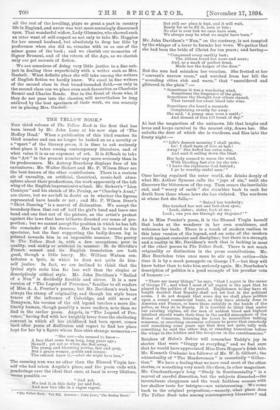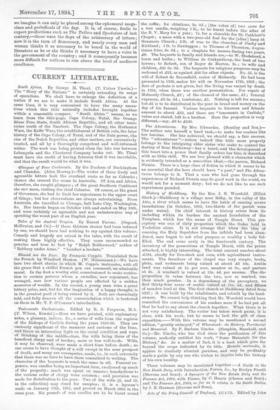THE YELLOW BOOK.* THE third volume of The Yellow Book
is the first that has been issued by Mr. John Lane at his new sign of The Bodley Head.' When a publication of this kind reaches its third number and can no longer be looked on as a novelty or a " sport " of the literary genus, it is time to ask seriously what place it takes among contemporary literature, and of what value it is as an exponent of art. It is difficult to take the "Art" in the present number any more seriously than in its predecessors. Mr. Aubrey Beardsley displays four of his caricatures ; Mr. Walter Sickert and Mr. P. Wilson Steer are the best-known of the other contributors. There is a curious air of unreality, an artificial, theatrical, music-hall atmo- sphere about their productions, the work apparently of the left wing of the English impressionist school. Mr. Sickert's "Lion Comique " and his sketch of Mr. Penley, as " Charley's Aunt," are clever, but we are left in doubt as to whether the figures represented have hands or not ; and Mr. P. Wilson Steer's "Skirt Dancing" is a marvel of dislocation. We accept the boundary-lines that cut off half the girl's head and leave one hand and one foot out of the picture, as the artist's protest against the laws that have hitherto directed our sense of pro- portion; but we cannot accept the position in which he has left the remainder of his danseuse. Her back is turned to the spectator, but the foot supporting the badly-drawn leg is pointed towards him in an impossible manner. The poetry in The Yellow Book is, with a few exceptions, poor in quality, and sickly or artificial in manner. M. de Heredia's French sonnet and its English translation are both good, though a little heavy. Mr. William Watson con- tributes a lyric, in which he does not quite do him- self justice. In fact, we are inclined to think that the lyrical style suits him far less well than the elegiac or descriptively critical style. Mr. John Davidson's "Ballad of a Nun" is decidedly forcible and clever. It is a new version of "The Legend of Provence," familiar to all readers of Miss A. A. Procter's poems; but Mr. Davidson's work has always the stamp of originality, and though his style bears traces of the influence of Coleridge, and still more of Tennyson, his version of the old legend touches a more dis- tinctly human, though possibly a more modern, note than we find in the earlier poem. Angela, in "The Legend of Pro- vence," having fled with her knightly lover from the sheltering convent in which all her childhood had been spent, comes back after years of disillusion and regret to find her place kept for her by a figure whose face stirs strange memories :— " She saw—she seemed to know— A face that came from long, long years ago ; Herself ; yet not as when she fled away, The young and blooming novice, fair and grey, But a grave woman, gentle and serene : The outcast knew it,--what she might have been."
The seeming nun was no other than the Blessed Virgin her- self who had taken Angela's place, and the poem ends with ponderings over the ideal that once, at least in every lifetime, seems possible :—
"And yet, We lost it in this daily jar and fret, And now live idle in a vague regret.
*The Yellow Book, Vol. III. London; John Lane, The Bodley Head.' But still our place is kept, and it will wait, Ready for us to fill it, soon or late ; No star is over lost we once have seen, We always may be what we might have been."
Mr. John Davidson's "Nun," on the contrary, is not tempted by the whisper of a lover to forsake her vows. We gather that she had been the bride of Christ for ten years ; and having—
"Conquered every earthly lust ; The Abbess loved her more and more; And, as a mark of perfect trust, Made her the keeper of the door."
But the nun had mistaken her vocation. She fretted at her "convent's narrow room," and watched from her hill the "sounding cities rich and warm," that "smouldered and glittered in the plain" :— "Sometimes it was a wandering wind, Sometimes the fragrance of the pine, Sometimes the thought how others sinned, That turned her sweet blood into wine.
Sometimes she heard a serenade Complaining sweetly far away : She said, A young man woos a maid ; ' And dreamt of love till break of day."
At last the magnetism of the unknown life that laughs and loves and keeps carnival in the nearest city, draws her. She unbolts the door of which she is wardress, and flies into the frosty night :— "'Life's dearest meaning I shall probe, Lo! I shall taste of love at last ! Away !' She doffed her outer robe,
And sent it sailing down the blast.
Her body seemed to warm the wind,
With bleeding feet o'er ice she ran : I leave the righteous God behind ; I go to worship sinful man.'" Once having regained the outer world, she drinks deeply of what Mr. Arthur Symons calls the "joys of sin," until she discovers the bitterness of the cup. Then comes the inevitable end, and "weary of earth" she stumbles back to seek for death from those whose laws she has violated. The wardress at whose feet she falls,— "Raised her tenderly ;
She touched her wet and fast-shut eyes; 'Look, sister ; sister, look at me ; Look ; can you see through my disguise?'"
As in Miss Procter's poem, it is the Blessed Virgin herself that looks at the wanderer in her own semblance, and welcomes her back. There is a touch of modern realism in this later version of the legend, and an echo of the modern revolt against restraint and discipline ; but there is a strength and a reality in Mr. Davidson's work that is lacking in most of the other poems in The Yellow Book. There is not much originality or distinction in the prose contributions. Mr. Max Beerbohm tries once more to stir up his critics—this time it is by a mock panegyric on George IV.—but they will know better than to take him seriously again. Mr. Beerbohm's description of politics is a good example of his peculiar vein of humour :— " There are many things," he says, "that I regret in the career of George IV., and what I most of all regret is the part that he played in the politics of the period. Englishmen to-day have at length decided that Royalty shall not set foot in the political arena. I do not despair that some day we shall place politics upon a sound commercial basis, as they have already done in America and France, or leave them entirely in the hands of the police, as they do in Russia. It is horrible to think that under our existing regime, all the men of noblest blood and highest intellect should waste their time in the sordid atmosphere of the House of Commons, listening for hours to nonentities talking nonsense, or searching enormous volumes to prove that somebody said something some years ago that does not quite tally with something he said the other day, or standing tremulous before the whips in the lobbies and the scorpions in the constituencies."
Readers of Helen's Babies will remember Toddy's joy in stories that were " bluggy as everyfing," and we feel sure that he would have appreciated Miss Nora Hopper's Irish tale. Mr. Kenneth Grahame is a follower of Mr. W. S. Gilbert; the whimsicality of "The Headswoman." is essentially " Gilber- tian." We have a feeling that we have read most of the other stories, or something very much like them, in other magazines. Mr. Crackanthorpe's long "Study in Sentimentality" is a marvel of careful dissection, but the subjects dissected—the invertebrate clergyman and the weak faithless woman with her shallow taste for intrigue—are uninteresting. We come back to the original proposition,—namely, what place does The Yellow Book take among contemporary literature ? and we imagine it can only be placed among the ephemeral map- zines and periodicals of the day. It is, of course, futile to expect productions such as The Tatlers and Spectators of last century,—those were the days of the aristocracy of letters ; now it is the turn of democracy, and nearly every man and woman thinks it as necessary to be heard in the world of literature as he or she thinks it necessary to have a voice in the government of the country ; and it consequently becomes more difficult for authors to rise above the level of mediocre excellence.



















































 Previous page
Previous page